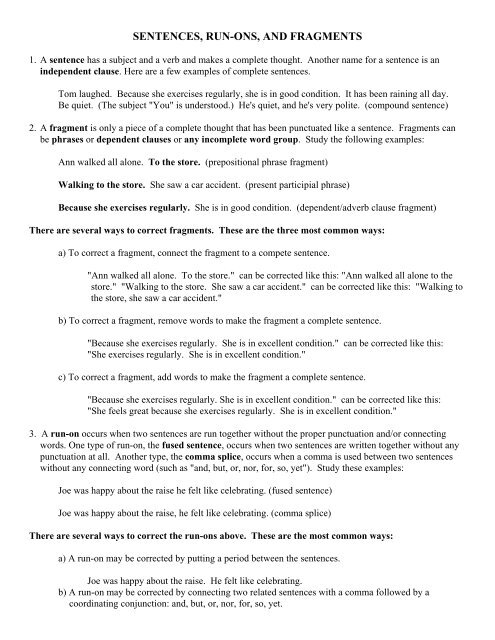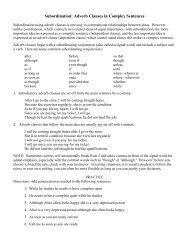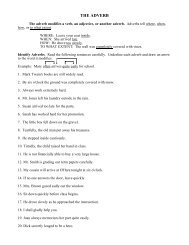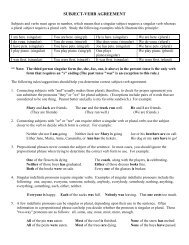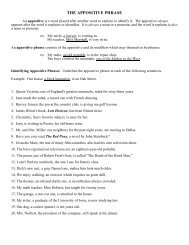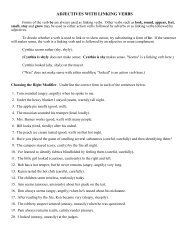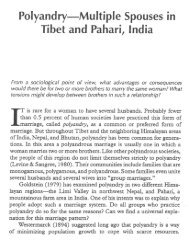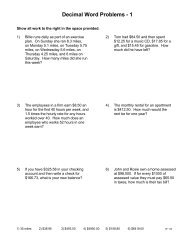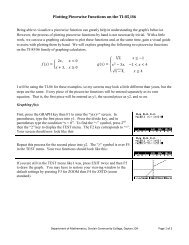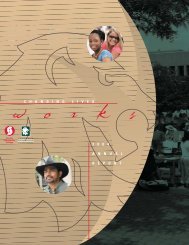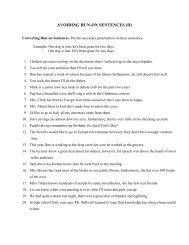SENTENCES, RUN-ONS, AND FRAGMENTS
SENTENCES, RUN-ONS, AND FRAGMENTS
SENTENCES, RUN-ONS, AND FRAGMENTS
You also want an ePaper? Increase the reach of your titles
YUMPU automatically turns print PDFs into web optimized ePapers that Google loves.
<strong>SENTENCES</strong>, <strong>RUN</strong>-<strong>ONS</strong>, <strong>AND</strong> <strong>FRAGMENTS</strong><br />
1. A sentence has a subject and a verb and makes a complete thought. Another name for a sentence is an<br />
independent clause. Here are a few examples of complete sentences.<br />
Tom laughed. Because she exercises regularly, she is in good condition. It has been raining all day.<br />
Be quiet. (The subject "You" is understood.) He's quiet, and he's very polite. (compound sentence)<br />
2. A fragment is only a piece of a complete thought that has been punctuated like a sentence. Fragments can<br />
be phrases or dependent clauses or any incomplete word group. Study the following examples:<br />
Ann walked all alone. To the store. (prepositional phrase fragment)<br />
Walking to the store. She saw a car accident. (present participial phrase)<br />
Because she exercises regularly. She is in good condition. (dependent/adverb clause fragment)<br />
There are several ways to correct fragments. These are the three most common ways:<br />
a) To correct a fragment, connect the fragment to a compete sentence.<br />
"Ann walked all alone. To the store." can be corrected like this: "Ann walked all alone to the<br />
store." "Walking to the store. She saw a car accident." can be corrected like this: "Walking to<br />
the store, she saw a car accident."<br />
b) To correct a fragment, remove words to make the fragment a complete sentence.<br />
"Because she exercises regularly. She is in excellent condition." can be corrected like this:<br />
"She exercises regularly. She is in excellent condition."<br />
c) To correct a fragment, add words to make the fragment a complete sentence.<br />
"Because she exercises regularly. She is in excellent condition." can be corrected like this:<br />
"She feels great because she exercises regularly. She is in excellent condition."<br />
3. A run-on occurs when two sentences are run together without the proper punctuation and/or connecting<br />
words. One type of run-on, the fused sentence, occurs when two sentences are written together without any<br />
punctuation at all. Another type, the comma splice, occurs when a comma is used between two sentences<br />
without any connecting word (such as "and, but, or, nor, for, so, yet"). Study these examples:<br />
Joe was happy about the raise he felt like celebrating. (fused sentence)<br />
Joe was happy about the raise, he felt like celebrating. (comma splice)<br />
There are several ways to correct the run-ons above. These are the most common ways:<br />
a) A run-on may be corrected by putting a period between the sentences.<br />
Joe was happy about the raise. He felt like celebrating.<br />
b) A run-on may be corrected by connecting two related sentences with a comma followed by a<br />
coordinating conjunction: and, but, or, nor, for, so, yet.
Joe was happy about the raise, so he felt like celebrating.<br />
c) A run-on may be corrected by connecting two related sentences with a semicolon only.<br />
Joe was happy about the raise; he felt like celebrating.<br />
d) A run-on may be corrected by connecting two related sentences with a semicolon and a transition<br />
word or phrase, such as following: however, therefore, thus, then, as a result, consequently,<br />
nevertheless, also, on the other hand, for instance, in contrast, etc.<br />
Joe was happy about the raise; consequently, he felt like celebrating.<br />
e) A run-on may be corrected by adding a dependent clause signal word to create a complex sentence.<br />
Common signal words include the following: because, if, although, when, who, which, etc.<br />
Because Joe was happy about the raise, he felt like celebrating.<br />
Joe, who was happy about the raise, felt like celebrating.<br />
Directions: Label each word group as one of the following: Fragment (F), Run-On (R), or Correct (C).<br />
Be prepared to explain how to correct each of the fragments and run-ons you have identified.<br />
1. Although Mary has been my best friend.<br />
2. No one I know watches that television show, I can't believe it.<br />
3. Her husband loves to cook, however, he does not like to clean the kitchen afterwards.<br />
4. Tim started his new job last Wednesday, and he really likes the boss.<br />
5. I have a hard time understanding her lectures, when I talk to her one-on-one, I understand her fine.<br />
6. Mary signed up because she thought the training would be interesting and help her on the job.<br />
7. Meet me after class, I want to talk with you about the upcoming test.<br />
8. The one who looks like a military officer but acts like a spoiled brat.<br />
9. Although she has studied very hard, she is still worried about the midterm exam.<br />
10. One of the best ways to improve your writing. Is to read and analyze what you read.<br />
11. It has been a long time since I have been to the beach, I am looking forward to the trip.<br />
12. When you have finished your homework and are ready to take a break.<br />
M:\9-TLC\TLC Web Design\Handouts Worksheets\Grammar.Punctuation.Writing\Sentences-Run - Ons, and<br />
Fragments.doc tan


